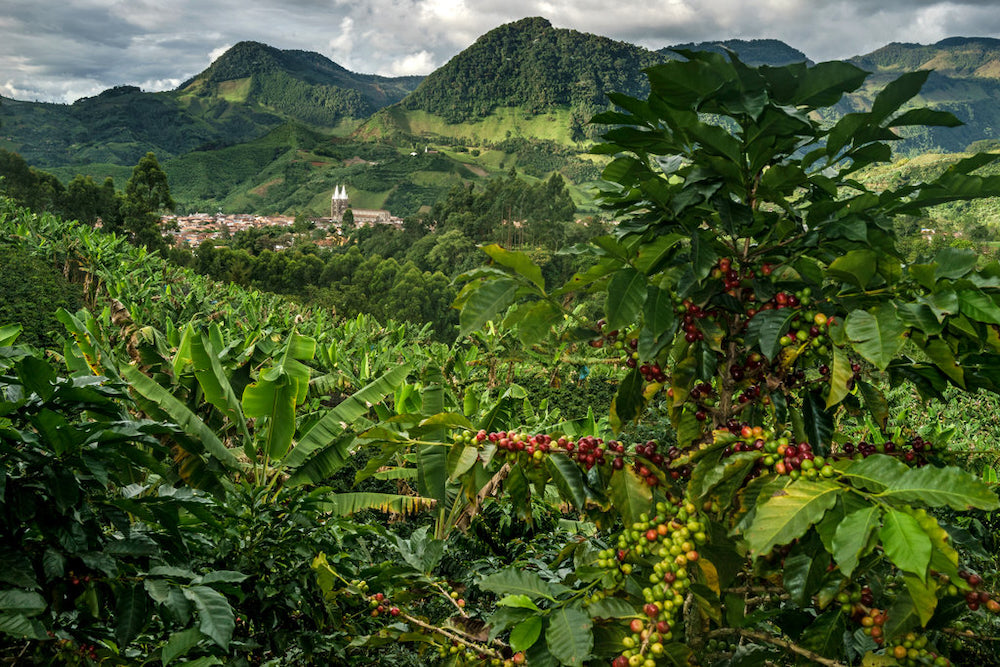Add description, images, menus and links to your mega menu
A column with no settings can be used as a spacer
Link to your collections, sales and even external links
Add up to five columns
Add description, images, menus and links to your mega menu
A column with no settings can be used as a spacer
Link to your collections, sales and even external links
Add up to five columns

Colombian Coffee
August 24, 2018 3 min read
Colombian Coffee
Colombian Coffee: A World-Class Brew
Colombian coffee is known for its rich flavor, unique aroma, and smooth finish. It is one of the most popular coffees in the world, and for good reason.
Flavor Profile of Colombian Coffee
Colombian coffee is typically characterized by its medium to high acidity, medium body, and sweet flavor. It often has floral notes, hints of tropical fruits, and a sweetness that can be reminiscent of chocolate, sugar cane, or caramel.
Growing Regions of Colombian Coffee
Colombia has a wide range of coffee growing regions, each with its own unique flavor profile. The coffee beans from the warmer, more northerly, lower altitude zones tend to have a lower acidity and a fuller body. The coffee beans from the more southerly, higher altitude zones tend to have a higher acidity and a more complex flavor profile.
The Colombian Coffee-Growing Axis
The largest coffee growing region in Colombia is the Colombian Coffee-Growing Axis, which is located around Medellin. This region is known for its heavy body, rich flavor, and higher acidity.
Colombian Coffee: A History of Success and Challenges
Coffee was first introduced to Colombia in the mid-16th century by Jesuit priests. It quickly became a popular crop, and Colombia soon became one of the world's leading coffee producers.
In the early 20th century, the Colombian Coffee Growers Federation (FNC) was founded to represent the interests of coffee growers and to promote Colombian coffee abroad. The FNC launched a successful marketing campaign that featured the fictional character Juan Valdez, which helped to make Colombian coffee one of the most popular brands in the world.
Colombian coffee is known for its high quality and distinctive flavor. It is typically characterized by its medium acidity, medium body, and sweet flavor. Colombian coffee is also known for its unique aroma, which often includes notes of citrus, fruit, and spice.
The Colombian coffee industry is facing a number of challenges, including climate change, pests and diseases, and the increasing cost of production. However, Colombian coffee growers are working to adapt to these challenges and to ensure that Colombian coffee remains a high-quality product.
One of the biggest challenges facing the Colombian coffee industry is climate change. Rising temperatures and unpredictable rainfall are making it difficult for coffee growers to produce high-quality coffee. Arabica beans, which make up the vast majority of Colombia's crop, are particularly vulnerable to climate change.
Another challenge facing the Colombian coffee industry is pests and diseases. Coffee rust fungus and the coffee berry borer insect are two of the most serious pests and diseases that affect coffee crops. These pests and diseases are becoming more widespread and difficult to control, which is leading to lower coffee yields.
The cost of production is also increasing for Colombian coffee growers. The price of fertilizers, pesticides, and other inputs is rising, which is making it more difficult for growers to make a profit.
Despite these challenges, Colombian coffee growers are working to adapt and to ensure that Colombian coffee remains a high-quality product. Some growers are experimenting with new farming techniques that they think might help offset the impacts of climate change. Others are working to develop new varieties of coffee that are more resistant to pests and diseases.
The Colombian coffee industry is important to the Colombian economy. Coffee is the country's third largest export, and it directly employs a half million farmers. The Colombian government is aware of the challenges facing the coffee industry and is working to support growers.
The future of Colombian coffee is uncertain, but there are reasons to be optimistic. Colombian coffee growers are resilient and resourceful, and they are working to adapt to the challenges they face. The Colombian government is also committed to supporting the coffee industry. With continued support, Colombian coffee growers can continue to produce high-quality coffee for years to come.
How to Enjoy Colombian Coffee
Colombian coffee can be enjoyed in a variety of ways. It can be brewed as a simple cup of coffee, or it can be used to make espresso drinks, such as lattes and cappuccinos. Colombian coffee is also a popular ingredient in coffee cocktails.
No matter how you choose to enjoy it, Colombian coffee is sure to please. It is a delicious and versatile coffee that can be enjoyed by coffee lovers of all types.
Subscribe
Sign up to get the latest on sales, new releases and more …
